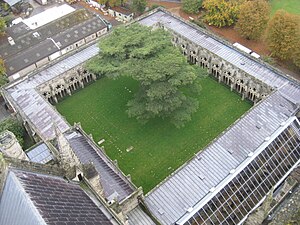
Back Claustro AN رواق معمد Arabic Клуатр Byelorussian Кружганак BE-X-OLD Клоатър Bulgarian Kloastr Breton Claustre Catalan Křížová chodba Czech Korsgang Danish Kreuzgang German

A cloister (from Latin claustrum, "enclosure") is a covered walk, open gallery, or open arcade running along the walls of buildings and forming a quadrangle or garth. The attachment of a cloister to a cathedral or church, commonly against a warm southern flank,[1] usually indicates that it is (or once was) part of a monastic foundation, "forming a continuous and solid architectural barrier... that effectively separates the world of the monks from that of the serfs and workmen, whose lives and works went forward outside and around the cloister."[1]
Cloistered (or claustral) life is also another name for the monastic life of a monk or nun. The English term enclosure is used in contemporary Catholic church law translations[2] to mean cloistered, and some form of the Latin parent word "claustrum" is frequently used as a metonymic name for monastery in languages such as German.[3] Cloistered clergy refers to monastic orders that strictly separate themselves from the affairs of the external world.
- ^ a b Horn 1973, p. 13.
- ^ "The Code of Canon Law, Canon 667 ff. English translation copyright 1983 The Canon Law Society Trust". Archived from the original on 19 June 2006. Retrieved 17 June 2006.
- ^ Cf. German Kloster.